
Lazy Load is coming to WordPress 5.4
Last week, the WordPress community received some big news about a possible speed optimisation tool that could be implemented into WordPress in the near future.
Felix Arntz, a developer programs engineer at Google and a core committer for WordPress (the guys who build and maintain the WordPress platform), announced that if their testing is successful, Lazy Loading for images will be introduced into WordPress 5.4 which is set to be released at the end of March.
What is Lazy Loading for images?
Lazy Loading tells your browser to only load images that appear above-the-fold. Any images below-the-fold will be loaded into the browser window once you begin to scroll down the page.
Why is Lazy Loading important?
There are a number of benefits to having images Lazy Loaded however, faster loading times for your website and saving visitors bandwidth are probably the most important.
Having the Lazy Load feature implemented on your website means that your website will load much faster because images don’t need to be loaded until a visitor has scroll to where the image/s are placed on the page.
For example, let’s say you have 10 images on your homepage and each of those image are 200kb in size.
Without Lazy Loading, your website needs to serve visitors with 2mb worth of images (10 x 200kb) before they can see anything.
If your visitors have a terrible internet connection then it could take ~10 seconds for your homepage to be visible to them.
If you had Lazy Loading setup on your website and only one of your 10 images was above-the-fold, that terribly internet connection of theirs only needs to download 0.2mb initially.
Theoretically, this means your visitors get to see your website 10x faster than they would have without Lazy Loading.
WordPress Lazy Loading Plugin
For those that can’t wait until the end of March, the WordPress team have released a beta plugin the Lazy Load feature. However, it’s important to note that this plugin is more for users interested in helping the developers find bugs before the final launch.
If you’d rather a set and forget plugin, there are a number of them in the WordPress Plugin Library that you can easily install and configure yourself.
Recommended Lazy Load Plugins
If you have any trouble installing the plugins below, be sure to get in touch with either our Brisbane WordPress team or our Gold Coast WordPress team. We’d be more than happy to help.

Lazy Load by WP Rocket
We actually use WP Rocket’s premium plugin for optimisation for all of the WordPress websites that we build. So, it’s only natural that we recommend a free tool by the very same developers.
This Lazy Load plugin works for all images in posts, pages, widgets and iframes. You can even replace YouTube videos with a preview thumbnail to speed up the loading time of your website even more.

a3 Lazy Load by a3rev Software
With over 200,000 active installations, it’s hard to pass on the plugin by the a3rev team. This plugin boasts an array of features like Lazy Loading images, videos, iframes and embeded posts. It’s even compatible with WooCommerce, WebP images and custom fields.
And if that’s not enough, it provides lazy loading effects like fadein and spinners to make sure your visitor’s experience isn’t interrupted.

Speed Up by Simone Nigro
Last but certainly not least is the Speed Up plugin. Although it’s fairly unused in the WordPress community with only 2000 active installs, I’ve included this plugin because it’s incredibly light. Weighing in at just 5kb, Speed Up will keep your dashboard fast and give you the tools to implement Lazy Loading for images without all the bells ‘n’ whistles.
What will happen to existing plugins?
This is a great question!
Hundreds of thousands of WordPress users are already using a Lazy Load plugin to speed up their website, so what happens when the update kicks in?
Well, it’s only natural to be concerned about this update affecting websites in March but the short answer is nothing. The WordPress Lazy Load update won’t cause any issues with users who wish to continue to use an existing plugin.
Why? Well the code within the test plugin we referenced above detects whether Lazy Load plugin exists already before initiating it’s own optimisation.
This means the WordPress 5.4 update should avoid any plugin conflicts and you can sleep easy knowing your website will continue to run just as it did before.
If you have any questions about what I’ve written above, please feel free to get in touch with me through our Contact page. Have a great day!

